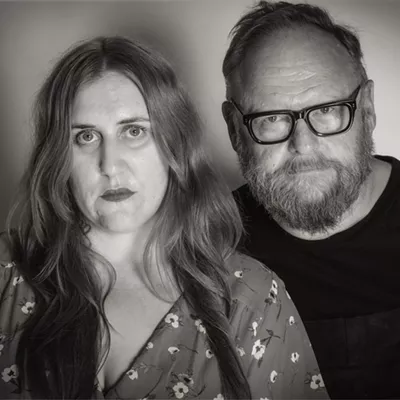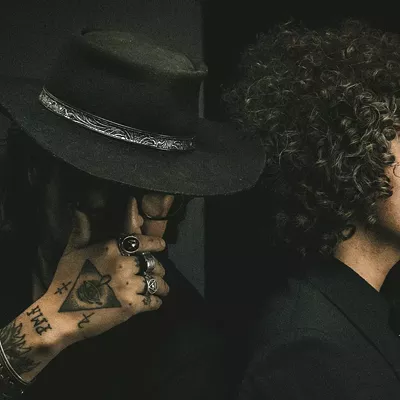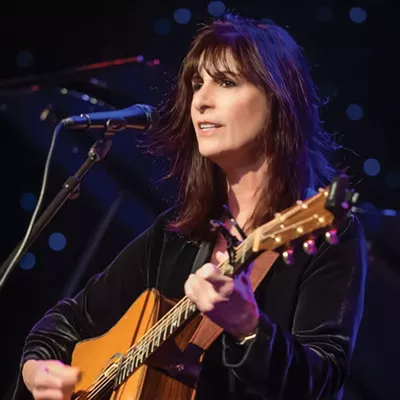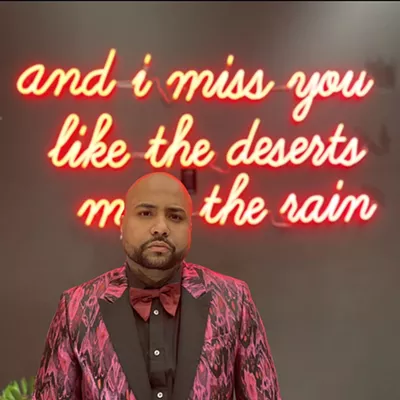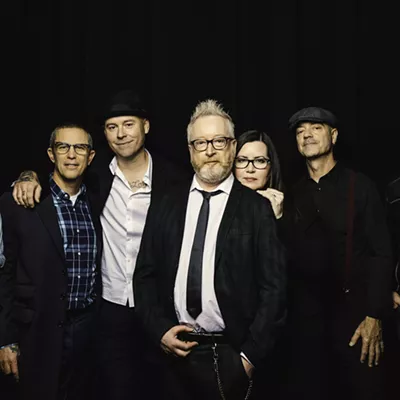"We had done that too many times, I guess," said Ladybug Transistor founding father and guitarist Gary Olson. "We were looking for something new, and we thought by getting outside of New York it might help us focus a little bit on getting things done a little faster."
So they packed their bags, and the songs they'd been perfecting over the last year or so, and came to Tucson to record at Wavelab Studios with Craig Schumaker.
"When we record stuff in our own studio, it tends to drag on a bit sometimes," explained Olson. "It never gets finished, because we always have the option of doing more. So we wanted to have a limited amount of time and figured Tucson would be a really nice place to go, especially in the middle of the winter. We heard a bunch of stuff that Craig had done, and we really liked the way that it sounded, because we were looking to do something different but not a complete change. We wanted to work with somebody else, and we figured Craig would be a natural choice because of how his records sound."
After a few weeks at Wavelab in March, the triumvirate songwriting team of Olson, Jeff Baron (guitar) and Sasha Bell (keyboards), along with drummer San Fadyl and bassist Julia Rydholm, produced the self-titled The Ladybug Transistor (Merge), the band's fifth studio record.
True to the shimmering '60s-inspired pop on their past records, The Ladybug Transistor takes off with a flourish and spins through 13 songs played on 12-string guitars, keyboards, strings and horns. The Ladybug Transistor sounds smoother than the band's previous efforts; every song expands on a melody, with Olson's gentle vibrato and Bell's soothing lilt easing the songs to a crescendo with a dramatic, nostalgic tone--more like old two-lane highways through a small southern town than the grid pattern below Prospect Park, which is where Marlborough Farms is located.
"Our albums in the past have all been neighborhood related, they're all named after streets in our area--Argyle, Beverly, Marlborough, Albemarle--they're all streets that are within a few blocks of our studio," said Olson. "We really love the neighborhood around here. Just walking around is inspirational--there are all these big houses and trees and cars just going by and you kind of hear that reference on lot of the earlier album lyrics. É We've been doing a lot of touring together over the past few years, so the newer songs have more of a travel theme."
The songs on The Ladybug Transistor talk of other places, of London, San Antonio, Virginia; of the difficulties of leaving and the excitement of being in a new place.
"Pack the cards, fold the table, roll the clock, blow the candle, before I am tired," sings Olson on "3=Wild," as guest musician Paul Niehaus of Lambchop and Calexico plays the pedal steel, "We're leaving town."
"On the morning train I watch your face grow warm, you want more of the sun," sings Bell on "The Places You'll Call Home." "But at this altitude we are melting here and there's little I can do, so today we say good-bye, and I'll see you in a month's time."
The dimensions of The Ladybug Transistor's songs come in part from the instrumentation and in part from the fact that three different members write songs.
"It adds sort of a creative dynamic, to have three songwriters," said Bell. "We show up with pretty finished songs, but then we fine-tune them as a group, and Gary writes a lot of the lyrics to the songs, so he's adding that. ... I think it adds a richness to it, to have three separate people coming in with different songs and then sort of adding to that; it adds patina, makes them one cohesive piece."
"Somehow, on this (record), it worked out really well, I think it's fairly consistent," said Olson. "Whereas some of our other ones were a little bit more all over the place. ... I think that the three of us do share common basic ideas of where the songs go, or where they should be going."
1999's The Albemarle Sound (Merge) garnered The Ladybug Transistor all kinds of critical acclaim with their "pastoral pop"; Magnet said of 2001's The Argyle Heir (Merge), "Imagine a place where grown men and women aren't afraid to roll sideways down hills and play on the teeter-totter." But The Ladybug Transistor is the band's best record yet; the fact that it's self-titled, and not named after a certain place, indicates that the band is moving beyond its insular neighborhood and out into the larger world. And they have Tucson to thank for that.
"It would have been strange to give (the record) a desert-type name," said Olson. "And also we had been through a lot of changing. It kinda has felt like a new start or new direction, so, I just wanted to sort of leave it open. It's not actually anything about being reborn or anything, or starting over, but it is kind of a fresh start, a new (path), and also there are some other records sort of mid-career records that are self-titled, like Metallica, the Beatles--they all did self-titled records later on. I thought that was kind of cool."
"Just being in Tucson, being out in the Southwest ... we had a really hard winter here, super cold, terrible weather, we were all feeling like we had the blues, then we go out to Tucson--it was a complete reversal," said Bell. "And Craig, he was our biggest cheerleader, our father, our engineer--he was just great in so many ways; he worked so hard, so being around him was a complete pleasure."
"It was nice, first of all, to be in a completely different environment where all we really had to do was think about was music for a finite period of time," said Rydholm. "When we record here it can really be drawn out over a really extended period of time; it might be interrupted with people going to work and then coming in at night, after being tired, in a completely different head space. It was just nice to have a time that was like a working holiday--it was sort of like a workshop where you're exclusively there to think about one thing."
"We were ready for the first time to do a record in the studio--we did a lot of preparation before this one," said Olson. "In the past, we may have had more of a germ of an idea, the basic idea for a song and we'd start recording it right away, it was always done in bits and pieces, whereas for this one we got together ... for about a month and worked out all the songs from top to bottom, ironed them out. É We figured this was the first time we'd be going into the studio and actually have a true plan, or more of a plan."
Added Rydholm, "It was nice to be able to walk around outside in a skirt and a T-shirt instead of being all bundled up in dreary New York. I think it really invigorated our focus."
That focus shows everywhere on The Ladybug Transistor; the songs meander within themselves, filling every possible inch with parts and layers. On "Please Don't Be Long," Bell's Cajun-style keyboards and Olson and Baron's guitar parts switch off in a jazz-style solo showcase. Dennis Cronin of Lambchop lends his trumpet to "Choking on Air," "NY- San Anton" and "Hangin' on the Line"; on the latter, as Bell sings "we wander, we wander," the instruments ironically swirl together. The strings courtesy of Michael Fan, Nelzimar Nevins and Julia Rydholm, combined with guitars and keyboards on the last song, "The Last Gent," leave you wanting more, as if you've been hypnotized by unearthly musical sprites.
Which hardly seems unlikely with a band like The Ladybug Transistor: "Way up the green above the tree line, we sat on the rock ledge, and with their instruments they played a melody," sings Olson on "Song for the Ending Day."

